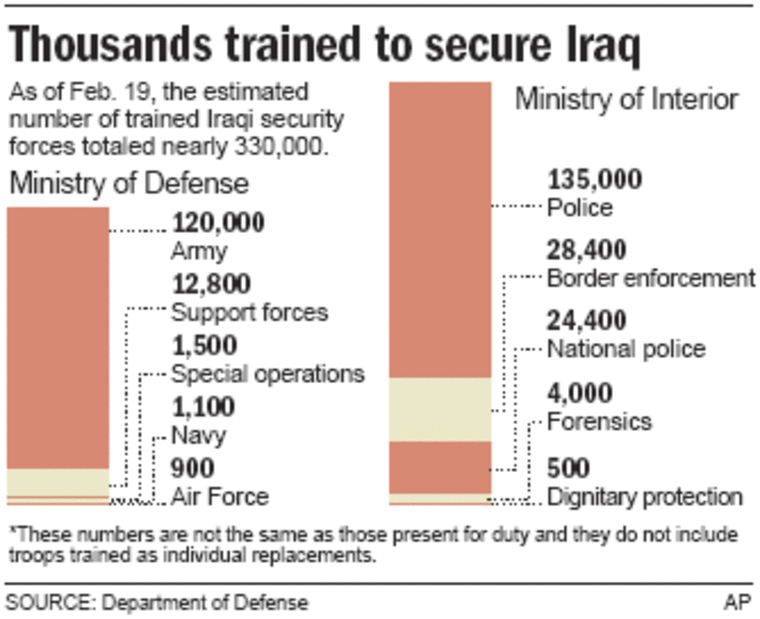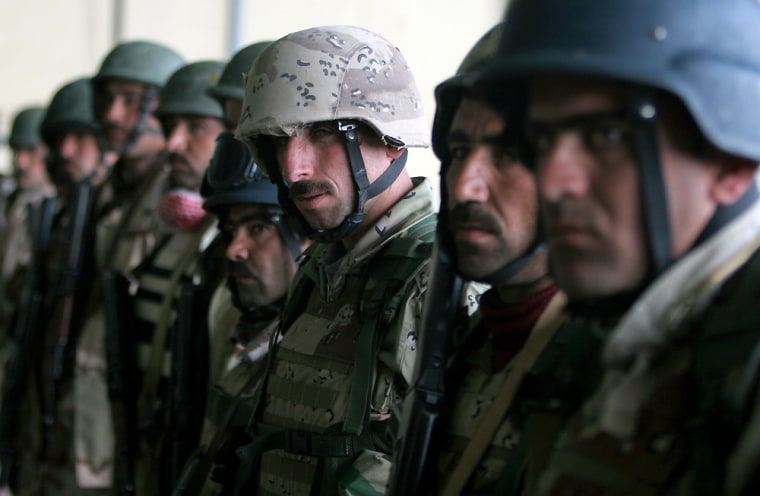More than three years and $15 billion into the U.S. effort to rebuild Iraqi forces, “ghost soldiers” still help fill Iraq’s army ranks and no one knows how many trained policemen remain on the job, the Pentagon and U.S. government investigators report.
The Government Accountability Office says the most serious problems lie in the logistics — supplies, maintenance, transport — of Iraqi security forces. One example: The police have more than 1,000 U.S.-made trucks whose computerized systems are beyond the skills of the Iraqi mechanics who repair them.
Since soon after the 2003 U.S. invasion, the training of new military and police forces has been presented as vital to the U.S. military’s handing over the counterinsurgency fight to the Iraqis.
In the current deployment of thousands of extra U.S. troops into Baghdad, the Americans are teaming up with Iraqi army units to try to control the Sunni Muslim insurgency and Sunni-Shiite sectarian violence.
Attacks have subsided somewhat in the operation’s first weeks, but journalists embedded with U.S. troops report distrust and a mismatch in capabilities between the Americans and Iraqis. The true test would come if the U.S. Army pulled back and such operations were left to the Iraqi army and police alone.
A GAO assessment of the record thus far isn’t encouraging.
“Even though the number of Iraqi forces has grown and more have taken the lead for security operations, violence in Iraq increased significantly through the end of 2006,” Joseph A. Christoff, international affairs chief for that congressional auditing office, said in testimony last week to a U.S. House subcommittee.
In its latest quarterly Iraq report, the Pentagon said 328,700 Iraqis have been trained for the security forces, including 136,400 soldiers — more than double the numbers of two years ago. But it added in the next sentence that the “actual number of present-for-duty soldiers is about one-half to two-thirds of the total due to scheduled leave, absence without leave, and attrition.”
'Ghost' soldiers exist only on paper
Many Iraqis go on authorized leaves for days to deliver their cash pay to their families. The Pentagon said Iraq’s defense and interior ministers also are aware of “ghost” soldiers and policemen who exist only on paper — a fraudulent device by which units can receive additional per capita resources, and corrupt officials can collect nonexistent recruits’ pay.

American commanders in the field attest to the impact of deserters, nonexistent soldiers and other attrition on Iraqi army battalions’ strength.
“The battalions out here are about 50 percent,” Col. William B. Crowe, a U.S. regimental commander in the embattled western province of Anbar, told reporters in January.
On the police side, under the Interior Ministry, the Americans don’t know “what percentage of the 180,000 police thought to be on the payroll are coalition trained and equipped,” Christoff testified.
Police ranks have lost many trained men — killed, wounded or simply departed out of fear for their lives or families — and local authorities have replaced them with men who haven’t gone through U.S.-overseen training. Even then, the U.S. Baghdad command estimates less than 70 percent of Interior Ministry personnel are present for duty on an average day, according to the March 14 Pentagon report.
In addition, Shiite militiamen have taken root within the Iraqi police. “Sectarian and militia influences have divided the loyalties of Iraqi security forces,” Christoff testified, citing U.S. intelligence.
Polish Maj. Gen. Pawel Lamla, a multinational forces commander in southeastern Iraq, said in an Associated Press interview Monday that police were failing to take action against local gunmen “because some of their (police) elements have connections with the militias.”
Illiteracy also a problem
The GAO agreed with the Pentagon assessment that logistics represents “the most significant shortcoming.” Among other problems, it cited illiteracy among troops to be trained in supply, maintenance and related work, a lack of skilled trainers, and a shortage of spare parts for the army’s motley motor pool — 21 types of utility vehicles, for example, from Chevrolets and Nissans to Czech Honkers.
The police were supplied with 1,179 American trucks they weren’t able to maintain “because its personnel were unable to work with the vehicles’ computerized systems,” GAO expert William M. Solis told a House subcommittee on March 9.
A network of supply depots, key to weaning Iraqi forces off dependence on the Americans for fuel, uniforms and other goods, has lagged behind schedule. The target date for completing garrison-level depots was moved from last December to next December, Solis reported. He quoted an unidentified senior U.S. official as saying that what was to have been a national depot north of Baghdad is “a depot in name only.”
Solis predicted Iraqi reliance on U.S. logistics will extend into 2008.
